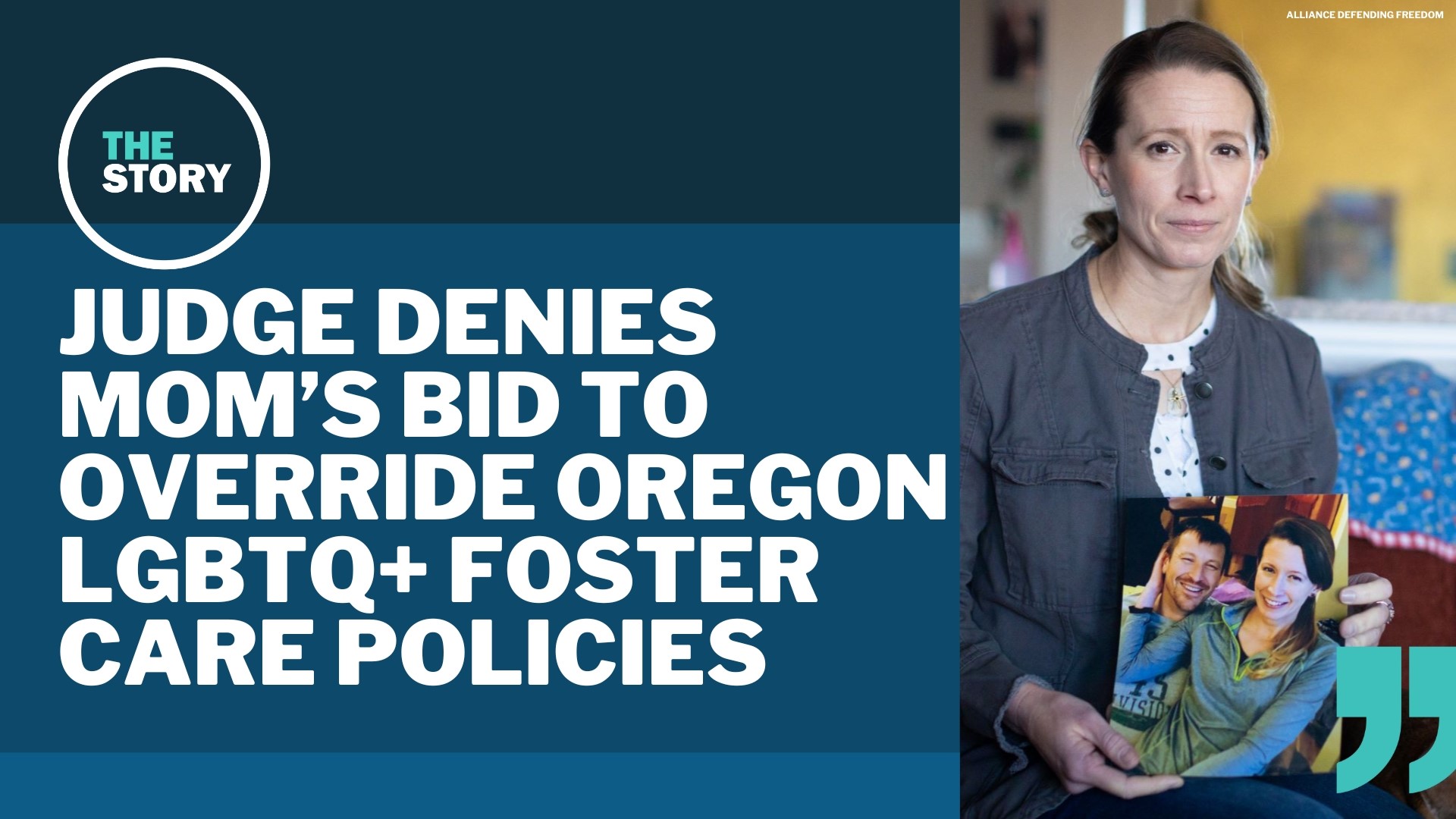MALHEUR COUNTY, Ore. — A mom from eastern Oregon who was denied the ability to become a foster parent over her views on LGBTQ+ identities received a major setback in federal court last month, something her attorneys plan to fight.
Jessica Bates, a single mother of five kids living in Malheur County, is suing the state of Oregon over its requirement that foster parents accept and support LGBTQ+ children in their care. Bates, a Christian, claims that doing so would violate her First Amendment free speech and freedom of religion protections.
In August, Bates' attorneys with the Alliance Defending Freedom, a Christian law firm and advocacy group that often takes on cases against LGBTQ+ rights, filed an injunction, seeking suspension of the LGBTQ+ rule to allow Bates to begin fostering children while the lawsuit plays out.
U.S. District Judge Adrienne Nelson ruled against Bates' motion in November, writing in her judgment, "This Court questions whether plaintiff's willingness to 'love and support' a child is sufficient to ensure that the child will feel loved and supported."
Nelson wrote that the state has an obligation to the wellbeing of the foster children in its care, not to the religious beliefs of potential foster parents. Oregon's Department of Human Services requires that certified foster homes "respect, accept and support the race, ethnicity, cultural identities, national origin, immigration status, sexual orientation, gender identity, gender expression, disabilities, spiritual beliefs and socioeconomic status of a child."
In her judgment, Nelson added that the aim of the rule is that a child will feel loved and supported, and that "None of these regulations, nor ODHS's behavior and decisions, implicate a hostility toward plaintiff's religious beliefs; rather, they are focused on the welfare of the child."
On Wednesday, Bates' team filed an appeal to the ruling.
In her application to become a foster parent, when asked whether she would support the sexual and gender identity of foster children placed in her care, Jessica Bates wrote, "I cannot support this behavior in a child. I have no problem loving them and accepting them as they are, but I would not encourage them in this behavior. I believe God gives us our gender/sex, and it's not something we get to choose." She went on to say that providing gender-affirming medical care like hormone injections would be child abuse.
RELATED: 'I cannot support this behavior in a child': Oregon mother sues state over LGBTQ+ adoption policy
Bates' attorney with ADF argued that her application was denied because of her religion, and that the state was trying to compel her to speak against her religion by requiring she use a child's chosen name or pronouns or take them to LGBTQ-affirming events.
"She was excluded because she would not essentially bow down to the state's orthodoxy on this principle that she would not, in theory, say that she would affirm practices and beliefs that she disagreed with, even if the child that she wanted to adopt didn't care about these issues," said Jonathan Scruggs, an attorney with ADF.
Judge Nelson decided that this argument doesn't hold up, and that the denial of Bates' application was not because of her religion, writing, "Religious applicants may also have neutral or pro-LGBTQ+ views" and that "religious beliefs are not the only basis for anti-LGBTQ+ views."
Bates had stated that she intended to adopt two children under the age of 9 from foster care, and raise them in her Christian church, attending church events, Bible studies, and following the teachings of a pastor who has espoused similar beliefs against LGBTQ+ individuals. She raised concern with Oregon's Department of Human Services guidelines for foster parents which discouraged forcing a child to participate in religious activities that may not affirm the LGBTQ+ community.
Judge Nelson ruled that Bates has every right to raise her five biological children in her church, but that when it came to foster children, no such right exists as she is not considered their legal parent, "thus, she cannot invoke a parent's right to instruct that child religiously."
"In essence, plaintiff seeks an accommodation that would permit her to impose her beliefs on another, and she has not, and cannot, identify any constitutional right to do so," Nelson wrote.
Nelson also wrote that the state has a compelling reason to require that foster parents provide children with a home that affirms LGBTQ+ identities, because LGBTQ+ children are overrepresented in the foster care system nationwide, and studies show that LGBTQ+ children growing up in unsupportive homes face adverse health outcomes. But DHS only requires that foster parents provide space for children to express and develop their identities, Nelson wrote, and does not require that parents participate themselves.
DHS suggests declaring a home a "hate-free zone" with signs, hanging pink triangles or Pride flags, but does not require them.
Nelson wrote that although Bates claims she would love and accept children as they are, that Bates has a fundamental misunderstanding of what it means to accept an LGBTQ+ child.
"The research presented by the government in this case indicates that a disaffirming family environment can have a severe impact on LGBTQ+ youth," Nelson wrote. "Plaintiff takes too narrow a view of what it means to support a child's identity. While plaintiff is correct that disagreement does not equate to disparagement, the Court also recognizes that the term 'rejection' takes many forms, and it includes the impact that invalidation can have on an LGBTQ+ youth.
"Put another way, the harm arises from how plaintiff's actions are perceived by the child, not from her personal intent. In essence, plaintiff's proposed methods would still invalidate a child's LGBTQ+ identity, even if plaintiff does not outright reject the child because of their identity."

